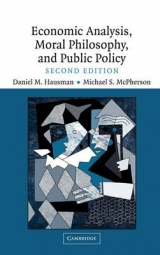
Economic Analysis and Moral Philosophy
Seiten
1996
Cambridge University Press (Verlag)
978-0-521-55202-8 (ISBN)
Cambridge University Press (Verlag)
978-0-521-55202-8 (ISBN)
- Titel erscheint in neuer Auflage
- Artikel merken
Zu diesem Artikel existiert eine Nachauflage
This book shows that economists and moral philosophers have a lot to learn from one another. It discusses methods of economic evaluation in terms of welfare and other moral criteria, and examines how such techniques as social choice and game theory are relevant to philosophy.
Understanding moral philosophy can lead to better economics. Conversely, economic insights and analytical tools can help philosophers. This book draws these two ideas together. Part I focuses on rationality and argues that, in defending their model of rationality, economists find themselves espousing fragments of a highly contestable moral theory. In Part II the authors consider the dubious theory of welfare implicit in standard evaluations of welfare economics and utilitarianism. Part III of this book is concerned with freedom, rights, equality, and justice, which are also important in evaluating economic policies and institutions. Part IV shows that technical work in economics is guided by ethical concepts and is relevant to moral theorizing.
Understanding moral philosophy can lead to better economics. Conversely, economic insights and analytical tools can help philosophers. This book draws these two ideas together. Part I focuses on rationality and argues that, in defending their model of rationality, economists find themselves espousing fragments of a highly contestable moral theory. In Part II the authors consider the dubious theory of welfare implicit in standard evaluations of welfare economics and utilitarianism. Part III of this book is concerned with freedom, rights, equality, and justice, which are also important in evaluating economic policies and institutions. Part IV shows that technical work in economics is guided by ethical concepts and is relevant to moral theorizing.
Introduction; 1. Ethics and economics; 2. Two examples; Part I. Rationality and Morality: 3. Rationality; 4. Rationality in positive and normative economics; 5. Rationality, norms and morality; Part II. Welfare and Consequences: 6. Welfare; 7. Efficiency; 8. Utilitarianism and consequentialism; Part III. Libert, Rights, Equality and Justice: 9. Liberty, rights and libertarianism; 10. Equality and egalitarianism; 11. Justice and contractualism; Part IV. Moral Mathematics: 12. Social choice theory; 13. Game theory; Part V. Conclusions: 14. Conclusions; Appendix: How could ethics matter to economics?
| Erscheint lt. Verlag | 28.3.1996 |
|---|---|
| Reihe/Serie | Cambridge Surveys of Economic Literature |
| Verlagsort | Cambridge |
| Sprache | englisch |
| Maße | 158 x 235 mm |
| Gewicht | 497 g |
| Themenwelt | Geisteswissenschaften ► Philosophie ► Ethik |
| Wirtschaft ► Allgemeines / Lexika | |
| Wirtschaft ► Volkswirtschaftslehre | |
| ISBN-10 | 0-521-55202-8 / 0521552028 |
| ISBN-13 | 978-0-521-55202-8 / 9780521552028 |
| Zustand | Neuware |
| Informationen gemäß Produktsicherheitsverordnung (GPSR) | |
| Haben Sie eine Frage zum Produkt? |
Mehr entdecken
aus dem Bereich
aus dem Bereich



